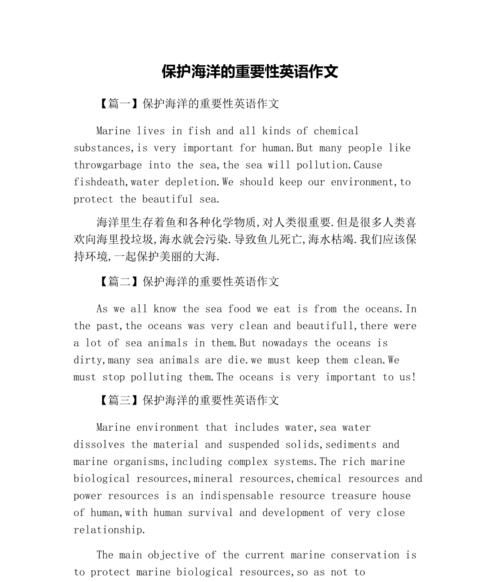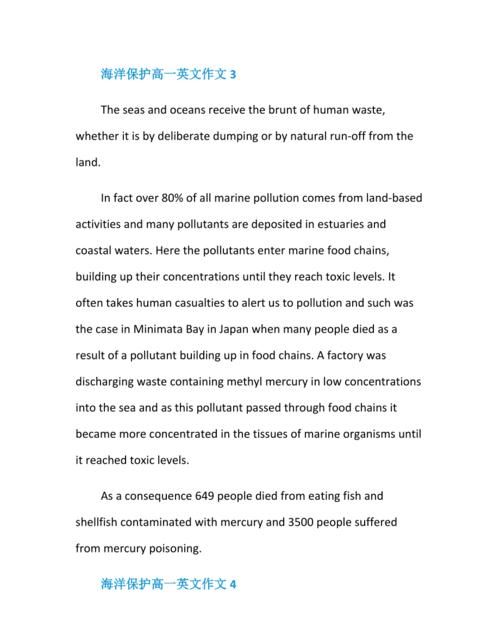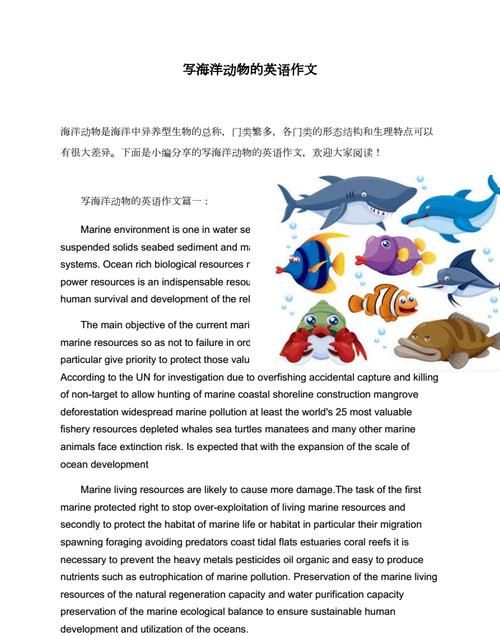本文目录
如何保护海洋的英语作文带翻译
看完这几篇 英语 作文 ,来一起学习保护海洋的知识吧。下面是我给大家带来保护海洋英语作文,供大家参阅!
保护海洋英语作文篇1
Sea pollution
Between 75 and 80% of marine pollution is caused by land, particularly agriculture. 30% of this is from the atmosphere. Around 12% of the pollution is caused by maritime transport.
In South America, 98% of domestic wastewater ends up, untreated, in the sea. The countries along the Mediterranean Sea throw 50 million tons of waste into it every year and the Chinese throw 60 million tons of waste into the Yellow sea daily. Over half of the hydrocarbon discharge comes from continents, 5% comes from oil tanker accidents, 20% comes from waste and other ship-related accidents, 4% from sea exploitation and 11 to 15% is due to natural causes. Accidental pollution through hydrocarbon is significantly decreasing and only represents a small percentage of waste through degassing estimated at between 1.5 and 3 million tons of oil a year. In 2003, according to the WWF, between 0.7 and 1.3 million tons of oil were spread by degassing in the Mediterranean. According to the Ifremer (the French Institute for Exploitation of the Sea), coastal water pollution cost the world economy almost 12.8 billion dollars in 2006.
Marine pollution is the result of products being thrown into seas and oceans, mostly by mnkind: domestic waste (sewage and rubbish, pollutants in runoff water...), industrial waste (hydrocarbons, metals, synthetic chemical and organic substances, radionuclides...) and agricultural waste (fertilisers, pesticides...).
This includes water pollution and marine sediments, and more generally all damage to marine ecosystems caused by harmful substances being discharged into the sea, either by their nature or their quantity.
保护海洋英语作文篇2
Reduce Sea Pollution
Sea pollution is becoming an increasing problem for our planet and we have a responsibility to reduce sea pollution.
I need to describe the problem. Our ship currently dumps all its rubbish into the sea.It's easy to result in huge endanger. First of all, Non-organic substances such as plastic bags kill fish and whales. Because fish get trapped and whales cannot digest them. Secondly some rubbish is inherently toxic.
I can suggest some solutions. First and foremost we can create a better system of disposing of rubbish for instance. We ought to store rubbish. Next, we are supposed to make ships environmentally and friendly. A case in point is that we should stop providing plastic bags.
We must act now before it is too late!
保护海洋英语作文篇3
The ocean is downstream of everything, so all of our actions, no matter where we live, effect the ocean and the marine life it holds. Those who live right on the coastline will have the most direct impact on the ocean, but even if you live far inland, there are many things you can do that will help marine life.
Brand X Pictures/ Stockbyte/ Getty Images
• Eat Eco-Friendly Fish
Our food choices have a huge impact on the environment - from the actual items we eat to the way they are harvested, processed, and shipped. Going vegan is better for the environment, but you can take small steps in the right direction by eating eco-friendly fish and eating local as much as possible. If you eat seafood, eat fish that is harvested in a sustainable way, which means eating species that that have a healthy population, and whose harvest minimizes bycatch and impacts on the environment.
• Limit Your Use of Plastics, Disposables and Single-Use Projects
Have you heard of the Great Pacific Garbage Patch? That is a name coined to describe the huge amounts of plastic bits and other marine debris floating in the North Pacific Subtropical Gyre, one of five major ocean gyres in the world. Sadly, all the gyres seem to have their own garbage patch.
What is the problem? Plastic stays around for hundreds of years, can be a hazard to wildlife and leaches toxins into the environment. The solution? Stop using so much plastic. Buy things with less packaging, don't use disposable items and use reusable bags instead of plastic ones wherever possible.
• Stop the Problem of Ocean Acidification
Global warming has been a hot topic in the ocean world, and it is because of ocean acidification, known as 'the other global warming problem.' As the acidity of the oceans increases, it will have devastating impacts on marine life, including plankton, corals and shellfish, and the animals that eat them.
But you can do something about this problem right now - reduce global warming by taking simple steps that will likely save money in the long run - drive less, walk more, use less electricity and water - you know the drill. Lessening your "carbon footprint" will help marine life miles from your home. The idea of an acidic ocean is scary, but we can bring the oceans to a more healthy state with some easy changes in our behavior.
• Be Energy-Efficient
Along with the tip above, reduce your energy consumption and carbon output wherever possible. This includes simple things like turning off the lights or TV when you're not in a room, and driving in a way that increases your fuel efficiency. As Amy, one of our 11-year old readers said, "It might sound strange, but being energy efficient helps the Arcticmarine mammals and fish because the less energy you use the less our climate heats up - then the ice won't melt."
Volunteers at a beach cleanup in New Hampshire. © Jennifer Kennedy / Blue Ocean Society for Marine Conservation
• Participate in a Cleanup
Trash in the environment can be hazardous to marine life, and people too! Help clean up a local beach, park or roadway and pick up that litter before it gets into the marine environment. Even trash hundreds of miles from the ocean can eventually float or blow into the ocean. The International Coastal Cleanup is one way to get involved - that is a cleanup that occurs each September. You can also contact your local coastal zone management office or department of environmental protection to see if they organize any cleanups.
• Never Release Balloons
Balloons may look pretty when you release them, but they are a danger to wildlife, who can swallow them accidentally, mistake them for food, or get tangled up in their strings. After your party, pop the balloons and throw them in the trash instead of releasing them.
California sea lion at Pier 39. Upon closer inspection, this sea lion appears to be entangled in monofilament fishing line. Courtesy John-Morgan, Flickr
• Dispose of Fishing Line Responsibly
Monofilament fishing line takes about 600 years to degrade. If left in the ocean, it can provide an entangling web that threatens whales, pinnipeds and fish (including the fish people like to catch and eat). Never discard your fishing lineinto the water - dispose of it responsibly by recycling it if you can, or into the garbage.
Two humpback whales lunge-feeding near a whale watch boat as passengers look on in awe. © Jen Kennedy, Blue Ocean Society for Marine Conservation
• View Marine Life Responsibly
If you're going to be viewing marine life, take steps to do so responsibly. Watch marine life from the shore by going tide pooling. Take steps to plan a whale watch, diving trip or other excursion with a responsible operator. Think twice about "swim with dolphins" programs, which may not be good for dolphins and could even be harmful to people.
Scuba diver and a whale shark (Rhincodon typus) in the Indian Ocean, Ningaloo Reef, Australia. Jeff Rotman / Getty Images
• Volunteer or Work With Marine Life
Maybe you work with marine life already, or are studying to become a marine biologist. Even if working with marine life isn't your career path, you can volunteer. If you live near the coast, volunteer opportunities may be easy to find. If not, you can volunteer on field expeditions such as those offered by Earthwatch as Debbie, our guide to insects, has done, where she learned about sea turtles, wetlands and giant clams!
• Buy Ocean-Friendly Gifts
Give a gift that will help marine life. Memberships and honorary donations to non-profit organizations that protect marine life can be a great gift. How about a basket of environmentally-friendly bath or cleaning products, or a gift certificate for a whale watch or snorkeling trip? And when you wrap your gift - be creative and use something that can be re-used, like a beach towel, dish towel, basket or gift bag.

如何保护海洋环境英语作文100字
海洋环境,对于海底动物的生存有如何重要我们可以通过这几篇英文文章了解到。下面是我给大家整理的如何保护海洋环境英语作文,供大家参阅!
如何保护海洋环境英语作文篇1
Reduce Sea Pollution
Several problems are caused by the non-organic substance. We ought not to pour wastes into the ocean, because it not only pollutes the ocean, but also lead to a series of harmful consequence. First and foremost, the non-organnic things, for instance, plastic bags, may kill fish and whales. Second, fishes can't digest them. Finally, some of the rubbish is inherently toxic, they will posion marine life.
We must take actions to protect our whale from dying. One thing we should do is creating a better system of disposing of rubbish. Another effective solution is making ships environmentally friendly. Sypermarkets shall stop the giving of plastic bags.
As a captain of the ship, you should spare no efforts to think more helpful ideas and stop dumping rubbish from now on. We all need to raise awareness of these problems. It now becomes necessary that we must act now, before it is too late!
如何保护海洋环境英语作文篇2
Polluting the seas
The seas and oceans receive the brunt of human waste, whether it is by deliberate dumping or by natural run-off from the land.
In fact over 80% of all marine pollution comes from land-based activities and many pollutants are deposited in estuaries and coastal waters. Here the pollutants enter marine food chains, building up their concentrations until they reach toxic levels. It often takes human casualties to alert us to pollution and such was the case in Minimata Bay in Japan when many people died as a result of a pollutant building up in food chains. A factory was discharging waste containing methyl mercury in low concentrations into the sea and as this pollutant passed through food chains it became more concentrated in the tissues of marine organisms until it reached toxic levels.
As a consequence 649 people died from eating fish and shellfish contaminated with mercury and 3500 people suffered from mercury poisoning.
如何保护海洋环境英语作文篇3
Sea Pollution
Marine environment is one in water, seawater tolerance hydrolyzate and suspended solids, seabed sediment and marine organisms, including complex systems. Ocean rich biological resources, mineral resources, chemical resources and power resources is an indispensable resource treasure house of human beings, with human survival and development of the relationship very close.
The main objective of the current marine conservation is to protect the living marine resources, so as not to failure, in order for human sustainable use. In particular, give priority to protect those valuable and critically endangered marine life. According to the UN for investigation, due to overfishing, accidental capture and killing of non-target to allow hunting of marine, coastal shoreline construction, mangrove deforestation, widespread marine pollution, at least the world's 25 most valuable fishery resources depleted, whales, sea turtles, manatees and many other marine animals face extinction risk. Is expected that with the expansion of the scale of ocean development,Marine living resources are likely to cause more damage.
The task of the first marine protected right to stop over-exploitation of living marine resources and secondly to protect the habitat of marine life or habitat, in particular, their migration, spawning, foraging, avoiding predators coast, tidal flats, estuaries, coral reefs, it is necessary to prevent the heavy metals, pesticides, oil, organic and easy to produce nutrients such as eutrophication of marine pollution. Preservation of the marine living resources of the natural regeneration capacity and water purification capacity, preservation of the marine ecological balance, to ensure sustainable human development and utilization of the oceans.

保护海洋的高中英语作文100
海洋是生命的摇篮,所以我们要保护海洋。下面是我为大家精心整理的关于保护海洋的高中英语作文,希望能够帮助到你们。

保护海洋
Marine environment is one in water, seawater tolerance hydrolyzate and suspended solids, seabed sediment and marine organisms, including complex systems. Ocean rich biological resources, mineral resources, chemical resources and power resources is an indispensable resource treasure house of human beings, with human survival and development of the relationship very close.
The main objective of the current marine conservation is to protect the living marine resources, so as not to failure, in order for human sustainable use. In particular, give priority to protect those valuable and critically endangered marine life. According to the UN for investigation, due to overfishing, accidental capture and killing of non-target to allow hunting of marine, coastal shoreline construction, mangrove deforestation, widespread marine pollution, at least the world's 25 most valuable fishery resources depleted, whales, sea turtles, manatees and many other marine animals face extinction risk. Is expected that with the expansion of the scale of ocean development,
Marine living resources are likely to cause more damage.
The task of the first marine protected right to stop over-exploitation of living marine resources and secondly to protect the habitat of marine life or habitat, in particular, their migration, spawning, foraging, avoiding predators coast, tidal flats, estuaries, coral reefs, it is necessary to prevent the heavy metals, pesticides, oil, organic and easy to produce nutrients such as eutrophication of marine pollution. Preservation of the marine living resources of the natural regeneration capacity and water purification capacity, preservation of the marine ecological balance, to ensure sustainable human development and utilization of the oceans.
保护海洋
The earth scale change of climate has brought a new kind of natural disaster and the developed and complicated city system is holding a latent risk of expanding the damage artificially. Also people has been spoiling the health since the immense quantity of chemicals have been produced and already used in pursuit of convenience and various toxic substances have been produced unintentionally and accumulated in environment. Therefore, We need some countermeasures from the viewpoint to prevent the city environment form disaster and to manage environmental risks. So we will develop and improve a new risk management system and a disaster prevention system to preserve and create the city environment where people feel easy and sound in their life.
保护海洋
here are many kinds of animals in the world,but not only the humans.we live in the same world,and we should be friends.as everybody knows,the humans are the rulers of the world today,so we should protect our friends--the animals!
But how to protect them?as first,i think we must stop killing the rare birds and animals,especially the young ones.the second,we have to protect the environment,to make the sky blue,to make the grass green,to give the animals a comfortable space to live
保护海洋
保护海洋动物的英语作文80字
The ocean is downstream of everything, so all of our actions, no matter where we live, effect the ocean and the marine life it holds. Those who live right on the coastline will have the most direct impact on the ocean, but even if you live far inland, there are many things you can do that will help marine life.
Brand X Pictures/ Stockbyte/ Getty Images
• Eat Eco-Friendly Fish
Our food choices have a huge impact on the environment - from the actual items we eat to the way they are harvested, processed, and shipped. Going vegan is better for the environment, but you can take small steps in the right direction by eating eco-friendly fish and eating local as much as possible. If you eat seafood, eat fish that is harvested in a sustainable way, which means eating species that that have a healthy population, and whose harvest minimizes bycatch and impacts on the environment.
• Limit Your Use of Plastics, Disposables and Single-Use Projects
Have you heard of the Great Pacific Garbage Patch? That is a name coined to describe the huge amounts of plastic bits and other marine debris floating in the North Pacific Subtropical Gyre, one of five major ocean gyres in the world. Sadly, all the gyres seem to have their own garbage patch.
What is the problem? Plastic stays around for hundreds of years, can be a hazard to wildlife and leaches toxins into the environment. The solution? Stop using so much plastic. Buy things with less packaging, don't use disposable items and use reusable bags instead of plastic ones wherever possible.
• Stop the Problem of Ocean Acidification
Global warming has been a hot topic in the ocean world, and it is because of ocean acidification, known as 'the other global warming problem.' As the acidity of the oceans increases, it will have devastating impacts on marine life, including plankton, corals and shellfish, and the animals that eat them.
But you can do something about this problem right now - reduce global warming by taking simple steps that will likely save money in the long run - drive less, walk more, use less electricity and water - you know the drill. Lessening your "carbon footprint" will help marine life miles from your home. The idea of an acidic ocean is scary, but we can bring the oceans to a more healthy state with some easy changes in our behavior.
• Be Energy-Efficient
Along with the tip above, reduce your energy consumption and carbon output wherever possible. This includes simple things like turning off the lights or TV when you're not in a room, and driving in a way that increases your fuel efficiency. As Amy, one of our 11-year old readers said, "It might sound strange, but being energy efficient helps the Arcticmarine mammals and fish because the less energy you use the less our climate heats up - then the ice won't melt."
Volunteers at a beach cleanup in New Hampshire. © Jennifer Kennedy / Blue Ocean Society for Marine Conservation
• Participate in a Cleanup
Trash in the environment can be hazardous to marine life, and people too! Help clean up a local beach, park or roadway and pick up that litter before it gets into the marine environment. Even trash hundreds of miles from the ocean can eventually float or blow into the ocean. The International Coastal Cleanup is one way to get involved - that is a cleanup that occurs each September. You can also contact your local coastal zone management office or department of environmental protection to see if they organize any cleanups.
• Never Release Balloons
Balloons may look pretty when you release them, but they are a danger to wildlife, who can swallow them accidentally, mistake them for food, or get tangled up in their strings. After your party, pop the balloons and throw them in the trash instead of releasing them.
California sea lion at Pier 39. Upon closer inspection, this sea lion appears to be entangled in monofilament fishing line. Courtesy John-Morgan, Flickr
• Dispose of Fishing Line Responsibly
Monofilament fishing line takes about 600 years to degrade. If left in the ocean, it can provide an entangling web that threatens whales, pinnipeds and fish (including the fish people like to catch and eat). Never discard your fishing lineinto the water - dispose of it responsibly by recycling it if you can, or into the garbage.
Two humpback whales lunge-feeding near a whale watch boat as passengers look on in awe. © Jen Kennedy, Blue Ocean Society for Marine Conservation
• View Marine Life Responsibly
If you're going to be viewing marine life, take steps to do so responsibly. Watch marine life from the shore by going tide pooling. Take steps to plan a whale watch, diving trip or other excursion with a responsible operator. Think twice about "swim with dolphins" programs, which may not be good for dolphins and could even be harmful to people.
Scuba diver and a whale shark (Rhincodon typus) in the Indian Ocean, Ningaloo Reef, Australia. Jeff Rotman / Getty Images
• Volunteer or Work With Marine Life
Maybe you work with marine life already, or are studying to become a marine biologist. Even if working with marine life isn't your career path, you can volunteer. If you live near the coast, volunteer opportunities may be easy to find. If not, you can volunteer on field expeditions such as those offered by Earthwatch as Debbie, our guide to insects, has done, where she learned about sea turtles, wetlands and giant clams!
• Buy Ocean-Friendly Gifts
Give a gift that will help marine life. Memberships and honorary donations to non-profit organizations that protect marine life can be a great gift. How about a basket of environmentally-friendly bath or cleaning products, or a gift certificate for a whale watch or snorkeling trip? And when you wrap your gift - be creative and use something that can be re-used, like a beach towel, dish towel, basket or gift bag.

以上就是关于保护海洋动物的意义英语作文 ,如何保护海洋的英语作文带翻译的全部内容,以及保护海洋动物的意义英语作文 的相关内容,希望能够帮到您。

